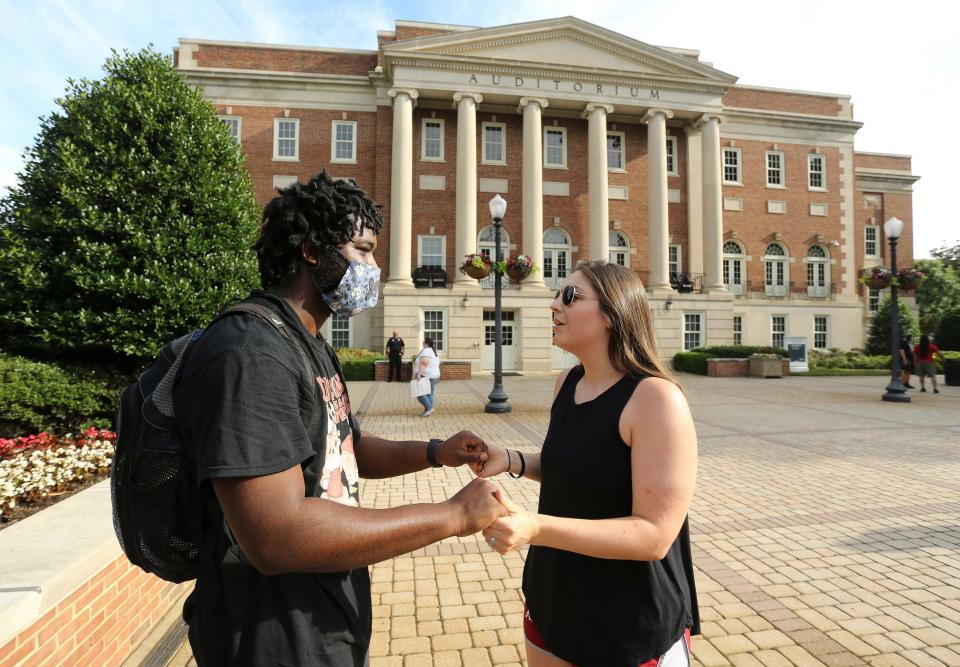The University of Alabama has closed dedicated spaces for its Black Student Union and LGBTQ+ resource center, citing a new state law banning publicly funded diversity, equity and inclusion (DEI) initiatives.
According to a statement provided by University of Alabama spokeswoman Alex House, school officials met with the Black Student Union and leaders of the organizations that used the Safe Zone Resource Center, which will be closed and not relocated due to Alabama’s law regarding DEI.
More: University of Alabama System to close Diversity, Equity and Inclusion offices
“Initiatives, programs and responsibilities across campus that do not comply with applicable new law are being discontinued or modified to be compliant in advance of Oct. 1,” the school wrote. “In accordance with state and federal laws, no university operation will contain impermissible restrictions, preferences or limitations related to race, color, religion, sex, ethnicity, national origin, sexual orientation or gender identity. A campus-wide communication sent in July announced broad compliance changes, and University staff are working to ensure compliance throughout campus.”
The news was first reported by the Crimson White, the University of Alabama’s student newspaper. Attempts to get comment from the Black Student Union Aug. 26 were unsuccessful. In an Instagram post the previous week, the organization wrote that their office was “relocated.”
“We are saddened by this loss– not just of a physical space, but of a place where we have gathered, shared, and built a community rooted in our shared experiences, struggles, and triumphs,” they wrote. “Our office was more than just four walls, it was a haven for all of us, a place where we could be ourselves, support one another, and celebrate our culture and heritage.”

Gov. Kay Ivey signed SB 129, sponsored by Sen. Will Barfoot, R-Pike Road, which limits the ability of public funds to be spent on diversity, equity and inclusion programs and limits the ability of public employees to discuss “divisive concepts.”
The law defines a “divisive concept” as any of the following:
-
“That any race, color, religion, sex, ethnicity, or national origin is inherently superior or inferior;”
-
“That individuals should be discriminated against or adversely treated because of their race, color, religion, sex, ethnicity, or national origin;”
-
“That the moral character of an individual is determined by his or her race, color, religion, sex, ethnicity, or national origin;”
-
“That, by virtue of an individual’s race, color, religion, sex, ethnicity, or national origin, the individual is inherently racist, sexist, or oppressive, whether consciously or subconsciously;”
-
“That individuals, by virtue of race, color, religion, sex, ethnicity, or national origin, are inherently responsible for actions committed in the past by other members of the same race, color, religion, sex, ethnicity, or national origin;”
-
“That fault, blame, or bias should be assigned to members of a race, color, religion, sex, ethnicity, or national origin, on the basis of race, color, religion, sex, ethnicity, or national origin;”
-
“That any individual should accept, acknowledge, affirm, or assent to a sense of guilt, complicity, or a need to apologize on the basis of his or her race, color, religion, sex, ethnicity, or national origin;” and
The University of Alabama system last month closed its DEI offices, citing the law. UA said they would launch the Division of Opportunities, Success and Connection, which would further “the University’s efforts to promote success for everyone in the UA community, including those who may face educational access and achievement challenges,” according to a statement from its launch.
The UA statement said university funds will no longer be used to continue programs at Safe Zone, and student employees were offered other opportunities. The staff role was vacant and will go unfilled, and the University said that no staff members were terminated due to the law.
“The university will continue to provide resources and support to every member of our campus community and remains committed to our institutional goals to welcome all, serve all and see all thrive and succeed,” the school wrote.
Registered student organizations can continue to have their own programming and reserve space in the Student Center and facilities.
“If student organizations wish to host or sponsor DEI programs or events that may promote a divisive concept, they must follow the requirements set forth by the law,” they wrote.
About 11.6% of Alabama’s student body in the fall of 2023 was Black, according to university statistics. The school has not yet released fall 2024 numbers.
In their statement, BSU wrote that the law is a reminder of the challenges they continue to face, and they remain committed to their mission for people of color at the school.
“We need to channel the energy we are feeling into a ‘clarion call’ to make a difference on the local, state, and national levels by mobilizing for voting,” they wrote. “This is not a time for apathy; voting is the most powerful tool we have as individuals.”
They wrote that they will continue to be a community and continue their activism.
“We are more than a space; we are a community, a family, and we will continue to thrive, no matter the obstacles placed before us,” they wrote.
This article originally appeared on The Tuscaloosa News: University of Alabama closes centers for Black, LGBTQ+ students
Source Agencies


